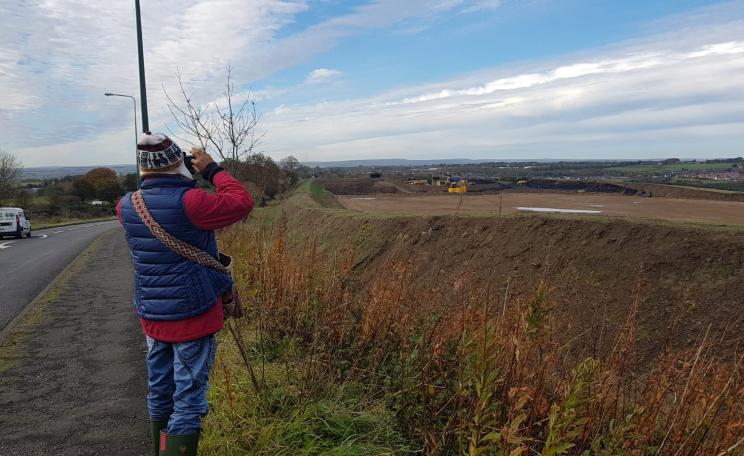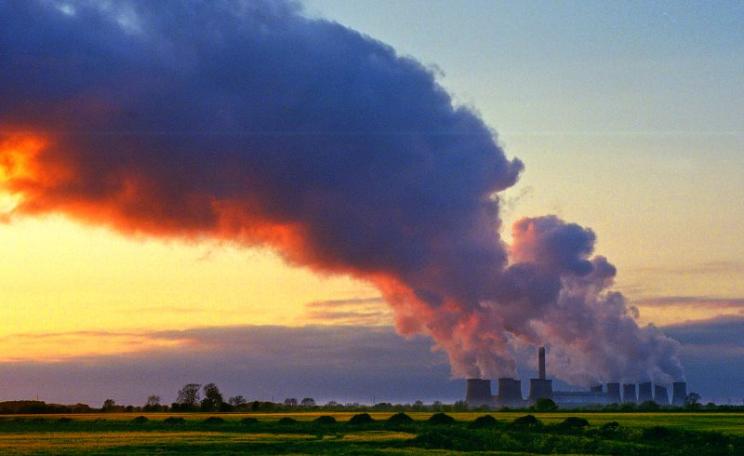A meaningful response to the climate crisis does not just require an end to coal but a rapid transition towards genuinely low-carbon renewable energy that does not involve burning carbon, coupled with a shift towards much lower energy use.
Theresa May's government finally confirmed its intention to end coal burning in power station in 2025 this January. This coal phaseout is long-overdue.
But the decision contains three dangerous loopholes: firstly, the government does not seek to end coal mining in the UK; secondly, it would allow plants to continue burning coal if large amounts of wood are cofired despite science showing that this is far from climate friendly and thirdly, the government is determined to compensate for the end of coal burning with a significant expansion in gas power station capacity.
Read our news story about the huge global slump in construction of new coal plants.
Amber Rudd, the then secretary of state for energy and climate change, announced “proposals to close coal by 2025 - and restrict its use from 2023” on the eve of the 2015 UN Climate Conference in Paris.
Electricity bill
What the Government committed to at that time was nothing more than holding a consultation. Worryingly, the emphasis was firmly on replacing coal with gas.
Still, it was the first time that a government anywhere had announced plans to end coal burning in power stations – though it is worth remembering that only 78 out of 195 countries in the world were burning coal for electricity in 2014, and that several countries, from Zambia to Switzerland, had ended coal power before then.
It took the government until January this year to publish its actual decision. By then it had been overtaken by several other European countries, with the French president having announced an end to coal burning in power stations as early as 2021 or 2022.
Meantime, UK coal electricity continued its steep decline: between 2011 and 2016, coal electricity fell by 72 percent, thanks largely to a trebling of electricity generation from wind and solar power and a reduction in electricity use due to greater efficiency.
Although the Government’s full 2017 energy statistics are yet to be published, coal burning clearly declined further last year. Perversely, coal power stations are being kept open artificially until 2025 - with the help of subsidies - funded through a surcharge on everybody’s electricity bill.
A meaningful response to the climate crisis does not just require an end to coal but a rapid transition towards genuinely low-carbon renewable energy that does not involve burning carbon, coupled with a shift towards much lower energy use.
The very fact that the Government has confirmed its intention to end coal burning for electricity in 2025 is a great success, thanks to years of persistent campaigning by climate activists and environmental NGOs.
Burning coal
After all, this is a Government which has axed almost all new onshore wind and solar subsidies, cut support for energy efficiency by 58 percent since 2012, handed North Sea oil companies £1.2 billion in tax rebates in 2017/18 alone, and is endeavouring to open up large swathes of the country to fracking.
Yet - while acknowledging an important milestone for climate campaigners - a critical assessment of what exactly has been decided is vital: Sadly, the coal phaseout announcement itself comes with several dangerous loopholes.
Firstly, the phaseout does not extend to mining coal. In Pont Valley, County Durham, Banks Group is set to open up a new opencast coal mine. Campaigners recently occupied the site.
The same company is trying to get planning permission for another such mine in Druridge Bay, Northumberland. The first new deep coal mine in three decades is proposed in Cumbria. Operations at existing opencast coal mines - the biggest of them at Ffos-y-Fran near Merthyr Tydfil - are continuing with no end in sight.
Secondly, instead of mandating the closure of all coal power stations, the government wants to only close those coal-burning units whose CO2 emissions exceed 450 kg/MWh - which is less than half what burning coal for electricity emits.
Worst impacts
This matters because it allows energy companies to continue burning coal indefinitely provided they co-fire it with large amounts of wood - wrongly considered carbon neutral under flawed carbon accounting mechanisms.
The UK is the world’s biggest importer of wood pellets, most of which come from the southern US, where carbon-rich forest ecosystems inside a global biodiversity hotspot are being clearcut, increasingly to make pellets which are then shipped across the Atlantic.
More than 800 scientists recently signed a letter which warns: “Even if forests are allowed to regrow, using wood deliberately harvested for burning will increase carbon in the atmosphere and warming for decades to centuries – as many studies have shown – even when wood replaces coal, oil or natural gas. The reasons are fundamental and occur regardless of whether forest management is ‘sustainable'.”
Yet the UK government – like others – continues to ignore the science. Cutting down trees and whole forests and burning the wood in power stations is classified as ‘low-carbon’, even though scientists have pointed out time and time again that it is commonly no better for the climate than burning coal, when considered over a generation or longer.
Climate science shows that we need to steeply reduce CO2 emissions now if we are to have any hope of avoiding the worst impacts of climate change.
Coal phaseout
So far, Drax power station has converted three of its six units to biomass and is about to convert a fourth one, albeit only to operate at a low capacity. EPH is converting the previously mothballed Lynemouth power station to biomass. Those conversions depend on previously guaranteed 'renewable electricity' subsidies. Again, this is paid out of a surcharge on our electricity bills). This is £1.5 million per day in the case of Drax.
Whether or not the ‘biomass loophole’ in the coal phaseout will lead to more biomass being burned in the UK depends on future subsidies decisions.
Regardless of what happens in the UK, this loophole sends a dangerous message to governments around the world, especially those that signed up to the Powering Past Coal Alliance launched by the UK and Canada at the Bonn Climate Summit in 2017, which commits signatories to work towards a coal phaseout.
Worryingly, nine of the countries which signed up to that Alliance also committed themselves to greatly increasing biomass burning in a misguided Vision Statement called “Scaling-up the low carbon bioeconomy” – the UK being one of them.
The third problem is that the government is still making a coal phaseout contingent on new gas power stations being built.
Hands of frackers
The government’s expressed optimism about “energy security” being guaranteed should not distract from the fact that a get-out clause is proposed which would allow a coal phaseout to be suspended if not ‘enough’ new gas capacity is built.
The government has scaled back its “ambitions” for new gas power capacity from 26 GW envisioned by George Osborne in 2012 - to 5.5 GW now foreseen.
But any new gas power stations are incompatible with the aim of keeping global warming to within 1.5oC, set out in the Paris Agreement.
Furthermore, the hype around such a new gas demand will play into the hands of frackers. Drax is in the process of applying for planning permission to replace its two remaining coal units with what would be the UK’s largest gas power station by far.
RWE, Eggborouh Power Ltd - owned by the Czech company EPH - and SSE have put forward large gas power proposals, too. So far, just one new gas plant – far smaller than those now proposed – has been built since 2013.
Genuinely low-carbon
Now, however, energy companies are pushing for high subsidies for gas and the caveats contained in the coal-phaseout announcement may just give them enough leverage to obtain those.
The UK’s coal phaseout thus serves as a case study for the importance of holistic energy campaigning: while we need to celebrate successes against one form of dirty energy, campaigners must be vigilant about false solutions pushed to replace it.
A meaningful response to the climate crisis does not just require an end to coal but a rapid transition towards genuinely low-carbon renewable energy that does not involve burning carbon, coupled with a shift towards much lower energy use.
This Author
Almuth Ernsting helped to found Biofuelwatch in 2006 and has been researching and campaigning on a broad range of issues related to the impacts of different forms of bioenergy since then, including biofuels for transport and wood-bsased bioenergy. She lives in Edinburgh.







